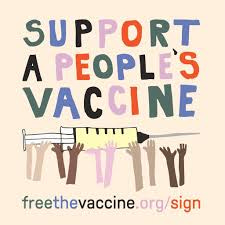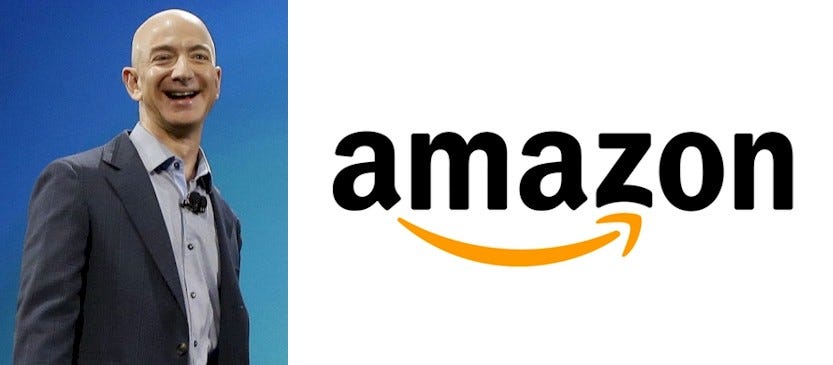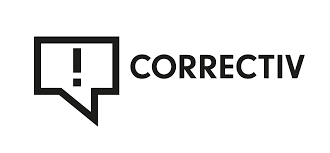Why Journalism Matters
Global campaigns gear up in the face of stratospheric profits for Covid drug companies, while investigative journalists look behind Amazon's smile. First, inspiration from Germany.
3 minute read
Ambition and imagination drive Germany’s leading non-profit investigative journalists

No one could ever accuse CORRECTIV, the German investigative journalism outlet of lacking either ambition or imagination.
CORRRECTIV began less than 10 years ago in Essen, a city in the Ruhr valley, known more for its industrial pollution and coal dust than cutting edge journalism. It was founded by investigative journalist David Schraven who remains at the helm.
Today CORRECTIV has built up an annual budget of about €4 million (USD$4.5 million), opened a newsroom in Berlin, and employs a staff of 60. This makes it one of the world’s largest non profit investigative journalism outlets. It collaborates with many leading media brands and is a member in good standing of the Global Investigative Journalism Network.
But its activities have not stopped at carrying out groundbreaking investigations, developing new technology and advanced citizen participation.
CORRECTIV also trains young journalists, runs a bookshop and publishes books; these include non-fiction, and even novels written by its journalists. It also puts on plays and exhibitions inspired by current affairs in an ongoing mission to develop audiences and engagement.
Independent coverage
CORRECTIV’S publications include a graphic novel “White Wolves” and a biography of the Turkish president Recep Tayyip Erdoğan.
(Jointly with exiled Turkish reporter Can Dündar, CORRECTIV operate the online media service #ÖZGÜRÜZ-- “We’re free”—in Turkish. Its reporters provide independent coverage from several cities in Turkey which reach millions of people via #ÖZGÜRÜZ’s moving image channels and social media. #ÖZGÜRÜZ often provides the only coverage of news events in Turkey that are suppressed in the country’s state-controlled media environment .)
And have we mentioned the annual journalism festival, and the local, online radio station, operated by some 40 teenagers, in nearby Bottrop?

As Schraven embarked on setting up CORRECTIV, he drew inspiration from others, including the US nonprofits ProPublica and the Center for Investigative Reporting.
But why launch a journalism start-up in an old mining city many miles from Germany’s main media centres?
Schraven answered in a recent interview for the GIJN website: “Here there are real-life problems. I thought, and I still think, that it’s very important to stay connected to what people really suffer from: poverty, unemployment, really bad healthcare systems, dying cities, inner-city problems… To stay in a workers’ area is quite important for a journalistic organisation, to avoid being disconnected.”
CrowdNewsroom
CORRECTIV has also shown that it not only believes in the power of the crowd— but that it knows how to harness that power to transform reporting and the understanding of an important public issues.
One of its pan-German projects examined the country’s housing market. As the German land registry’s individual entries are only accessible to the accommodation’s occupants, CORRECTIV was not able to independently gather the data it needed. Instead, it crowdsourced data from thousands of tenants throughout the country, using CrowdNewsroom, a platform it developed for this purpose.
The information collected helped CORRECTIV reveal the existence of anonymous real estate funds created to avoid taxes, as well as the ease with which illicit money can enter the real estate market.
CORRECTIV has also produced some groundbreaking coverage of tax fraud, particularly the so called VAT carousel fraud where illegal entities both charge VAT illegally and then reclaim it illegally in another EU country.
The Grand Theft Europe project looking into this fraud was launched in 2019 by CORRECTIV. WJM hopes to provide an exclusive update on their work on that project in an upcoming issue.
Projects like these have helped Schraven build on his vision of creating a newsroom that is as open and collaborative as possible. “You need to get people involved in reporting,” he says, “to help them better understand what journalism is about and what its worth is for society.”
Reference
5 minute read
Pfizer’s profits leave campaigners with little doubt about who really wins in the fight against Covid 19


.
Chief execs of the world’s leading pharmaceutical companies have lots of reasons to be cheerful.
The world’s people and their governments may have suffered through two years of illness, death and economic loss, but Big Pharma is celebrating record profits while enjoying the world’s gratitude for rolling back the tide of the pandemic.
Earlier this month Pfizer who early on acquired the patents for the first successful Covid vaccine, announced that its annual revenues had ballooned to $81 billion USD as a result—a figure higher than the GDPs of most countries in the world.
As WJM reported on June 4,2021 The CEOs of Pfizer and Moderna made tens of millions when they sold off big chunks of their personal shares when the companies’ stock price hit the stratosphere on the release of news about the first successful vaccine trials. And this was followed by a profitable rollout of billions of vaccines across the wealthy nations of the world.
Patent waiver
However, the pressing public issues that were thrown up in the wake of this corporate profit juggernaut, and the companies’ unwillingness to waive vaccine patents so that they can be manufactured more cheaply in poor nations has spurred campaigning organisations into action.
Charities like Oxfam, Global Justice Now, and People’s Vaccine Alliance have matched public outrage and reforming zeal with evidence-based journalistic research. The outrage is centred on the fact that while drug companies earn unprecedented profits, less than 3% of the population in poor nations have been fully vaccinated, or vaccinated at all.
The publicity and research reveal the uncertain boundary where campaigning and evidence-based investigative journalism meet. Organisations like the International Broadcasting Trust try to work in this space to improve mainstream media coverage of important advocacy campaigns.
UK-based Global Justice Now reported to its supporters in an email last week about the woeful vaccination rate in poor countries around the world. But in addition they reported that Covax, the WHO vaccine initiative set up to ensure lower-income countries would have access to Covid-19 vaccines, has run out of money, ‘needing a cash injection of $5.2 billion – a seventh of Pfizer’s expected vaccine revenues – to pay for syringes and other urgent supplies’.
Taxpayer funded
A few days ago, Director of Global Justice Now, Nick Drearden took to the pages of The Guardian to remind readers that it was the world’s taxpayers who had provided the investment that had so enriched Pfizer’s bottom line.
“The truth is, they aren’t the sole inventors of the vaccine. That was the work of public money, university research and a much smaller company, Germany’s BioNTech. As one former US government official complained, the fact we call it the ‘Pfizer’ vaccine is ‘the biggest marketing coup in the history of American pharmaceuticals.”’
Pfizer and other big pharma companies will argue that they had to risk large amounts of capital and resources to develop the vaccines in record time, conveniently forgetting that Pfizer’s bumper revenues are driven largely by the vaccine first developed by BioNTech with €100m in debt financing from the publicly-owned European Investment Bank and a €375m grant from the German government.
Pfizer also received a $1.9 billion early order from the US government to help take the risk out of the initial R&D.

As Drearden puts it in the Guardian essay: “Right from the start, Pfizer was clear that it wanted to make a lot of money from Covid. The company claims that its vaccine costs just under £5 per dose to produce. Others have suggested it could be much cheaper.
Huge profit
“ Either way, the company is selling doses at a huge profit – the UK government paid £18 a shot for its first order, £22 for its most recent purchase. That means the NHS has paid a mark-up of at least £2bn – six times the cost of the pay rise the government agreed to give nurses last year.”
According to the National Audit Office in the UK, as of December 2020 the UK government had already spent nearly £12 billion on Covid-19 vaccines.
Oxfam hunts out compelling stats to convey the size of Big Pharma’s profits.
“New figures from the Peoples Vaccine Alliance reveal that the companies behind two of the most successful COVID-19 vaccines —Pfizer, BioNTech and Moderna— are making combined profits of $65,000 every minute.
“Despite receiving public funding of over $8 billion, the three corporations have refused calls to urgently transfer vaccine technology and know-how with capable producers in low- and middle-income countries via the World Health Organisation (WHO), a move that could increase global supply, drive down prices and save millions of lives.
“In Moderna’s case, this is despite explicit pressure from the White House and requests from the WHO that the company collaborate in and help accelerate its plan to replicate the Moderna vaccine for wider production at its mRNA hub in South Africa.”
Despite well targeted publicity and protests, there is no sign as yet the campaigners are winning the ‘infodemic’ war against Big Pharma; the drug companies do not show any willingness to waive their patents or facilitate vaccine production in poorer countries.
They continue to bask in the miraculous speed and effectiveness of the vaccine rollout (in the wealthy world) and their development of new drug treatments to reduce mortality and serious illness in those who continue to be infected by Covid 19.
Reference
Global Justice in The Guardian
International Broadcasting Trust
4 minute read
Customers around the world put their faith in Amazon. Maybe not such a good idea. Read on

In 2018 a public opinion survey carried out by Georgetown University in America found that Amazon is the second most trusted institution in the country, after the US military.
The company that has put smiles on millions of cardboard packages dropped off on doorsteps around the world has always proclaimed that customers and their security are at centre the company’s mission.
But thanks to the revelations of whistleblowers, leaked company documents and the inquiries of investigative journalists, Amazon’s achille’s heel of poor data protection and failure to keep customer/seller info private is out in the open.
An extensive, eloquent and engaged essay by Will Evans at the Reveal US investigative outlet, in collaboration with Wired magazine has lifted the lid on how Amazon has put its customers in jeopardy in the pursuit of growing into every viable online retail space on earth.
Vast data empire
As Evans explains: “According to internal documents reviewed by Reveal from The Center for Investigative Reporting and WIRED, Amazon’s vast empire of customer data – its metastasizing record of what you search for, what you buy, what shows you watch, what pills you take, what you say to Alexa and who’s at your front door – had become so sprawling, fragmented and promiscuously shared within the company that the security division couldn’t even map all of it, much less adequately defend its borders.”
In the name of ‘speedy customer service’ and ‘unbridled growth’, Amazon has given its million strong worldwide workforce ‘extraordinary latitude to tap into customer data at will’.
In an interview for the article former Amazon chief information security officer, Gary Gagnon admitted that because Amazon has grown so fast and so far, a ‘free-for-all’ access to customer data developed.
While Amazon execs were extolling the company’s dedication to customer privacy and security, something quite different was happening further down the food chain.
Info security staff warned senior staff that because they didn’t know where all the data was, or where it was going there was a frightening ‘inability to detect security incidents’.
“According to Reveal and WIRED’s findings, [security incidents] were real, and they were pervasive.
“ Across Amazon, some low-level employees were using their data privileges to snoop on the purchases of celebrities, while others were taking bribes to help shady sellers sabotage competitors’ businesses, doctor Amazon’s review system and sell knock-off products to unsuspecting customers.”
Credit cards insecure
At one point in recent history, the lax security arrangements resulted in millions of credit card numbers sitting in the wrong place on Amazon’s internal network for years. When it was discovered, the security team couldn’t be sure that those numbers had not been wrongfully accessed.
“It was as if a bank had realised that some sacks of cash had been left in a back office, outside the vault, for several seasons. The exposure was corrected, but the scariest part was that there was no way to be sure whether anyone had snooped on the payment credentials during all that time – because the data set’s access logs only went back 90 days.”
Then the issue arose of what access third party sales outlets had to Amazon’s data treasure.
“… A program that allowed sellers [on Amazon] to extract their own metrics had become a backdoor for third-party developers to amass Amazon customer data.
“ In fact… Amazon had discovered that a Chinese data firm had been harvesting millions of customers’ information in a scheme reminiscent of Cambridge Analytica [and Facebook].”
In fact, the Cambridge Analytica scandal in 2018 brought personal data security into the public arena like never before. With some foresight two years earlier, in April 2016, the European Parliament passed the General Data Protection Regulation (GDPR).
“[This was] a sweeping consumer privacy law that would go into effect in 2018. After that, firms operating in Europe would be allowed to use people’s data under a stringent set of conditions, and sometimes only with their consent. Companies would also be required to make it possible for customers to have their data deleted.
“I don’t know how the hell we’re going to deal with that,” Gagnon remembers thinking, “because we have no idea where our fucking data is.”
Not prepared
Reveal’s investigation shows that Amazon was not prepared for this change, at least in terms of security technology and protocols.
Ignoring warnings about GDPR from their security staff has proven very costly for the company.
“ In August 2021, true to the warnings of Amazon’s privacy staffers, officials in Luxembourg levied $USD883 million in fines against the company for GDPR violations, a penalty more than twice as large as all prior GDPR fines against other companies put together.”
Amazon strongly disputes the ruling and says it will appeal.
Much more is revealed in Will Evans account than we can do justice here. It’s recommended reading for all Amazon geeks or anyone with a stake in the company. No doubt a big audience. See link below.
Reference
Reveal/Wired investigation into Amazon by Will Evans
Wired report on GDPR fine against Amazon
It’s free to subscribe and you can cancel anytime, so give it a try!
Contact us on greatjournalismwjm@gmail.com
Follow us on Facebook and Twitter
facebook.com/whyjournalism matters
twitter @JournalismWhy
Et maintenant disponible en français!




